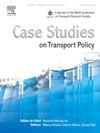Mode choice implications of fare-free public transport during the COVID-19 pandemic – Household survey-based results from a German case study
IF 3.3
Q3 TRANSPORTATION
引用次数: 0
Abstract
Cost and travel time are key factors influencing transport mode choice. Therefore, tariff measures are essential for enhancing the appeal of public transport. In addition to fare reductions, implementing free public transport is another viable alternative. However, there are only a few comprehensive evaluations of free public transport that consider both person-related and trip-related attributes. This study addresses this research gap by evaluating the fare-free public transport scheme in the German city of Monheim am Rhein. Using descriptive analyses and binary logit models, we demonstrate that fare-free public transport significantly increases the likelihood of its use. Notably, households with medium economic status are particularly inclined to switch to public transport as a result of this initiative. Personal attributes such as age, gender, car availability, employment status, and trip purpose do not significantly affect the impact of the fare-free scheme on mode choice. The positive effect of fare-free public transport in Monheim am Rhein is especially noteworthy given its implementation at the onset of the COVID-19 pandemic. The introduction of free access led to a quicker rebound in public transport usage compared to national averages post-pandemic. This suggests that long-term usage may surpass pre-COVID-19 levels. In summary, a local fare-free scheme can serve as an important opportunity for monomodal car users to experience public transport for the first time.
COVID-19大流行期间免费公共交通的模式选择影响——来自德国案例研究的基于家庭调查的结果
成本和出行时间是影响交通方式选择的关键因素。因此,关税措施对于提高公共交通的吸引力至关重要。除了降低票价外,实施免费公共交通是另一个可行的选择。然而,对免费公共交通的综合评估中,既考虑到与人相关的因素,也考虑到与出行相关的因素,却很少。本研究通过评估德国莱茵河畔蒙海姆市的免费公共交通计划来解决这一研究缺口。使用描述性分析和二元logit模型,我们证明了免费公共交通显著增加了其使用的可能性。值得注意的是,由于这一举措,中等经济状况的家庭特别倾向于改用公共交通工具。年龄、性别、车辆可得性、就业状况、出行目的等个人属性对免车费方案对出行方式选择的影响不显著。在新冠疫情爆发之际,莱茵河畔蒙海姆市实施了免费公共交通,其积极效果尤其值得关注。与大流行后的全国平均水平相比,免费通行的引入导致公共交通使用量更快地反弹。这表明长期使用可能超过covid -19前的水平。综上所述,当地的免费计划可以为单式汽车用户提供第一次体验公共交通的重要机会。
本文章由计算机程序翻译,如有差异,请以英文原文为准。
求助全文
约1分钟内获得全文
求助全文

 求助内容:
求助内容: 应助结果提醒方式:
应助结果提醒方式:


